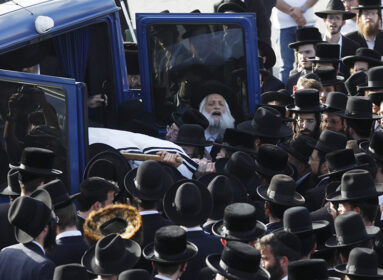
By Cindy Mindell
Nestled in the horse country of Greensboro, N.C., the American Hebrew Academy is an example of “if you build, it, they will come.”
The brainchild of Maurice “Chico” Sabbah z”l and his wife, Zmira, the idea to create an international, pluralistic Jewish prep school took root in 1995, when Sabbah’s parents died. While attending Beth David Synagogue in Greensboro over the next year to recite kaddish, Sabbah got to know the students, families, and staff of the local B’nai Shalom Day School and learned that there were no local Jewish day school options after eighth grade.
In 1996, the Sabbahs joined with several other local donors to create a response to that need. The group purchased a 100-acre wooded plot with lake frontage and, in 1999, hired architect Aaron Green, a protégé of American architectural icon Frank Lloyd Wright. Ground was broken in March 2000, with the first 77 students entering the new school, still under construction, on Sept. 10, 2001.
In 2003, Business Week magazine named Sabbah among America’s 50 most generous philanthropists, citing his $100 million donation to the school. Sabbah died in 2006, at age 77. His daughter, Leeor, is chair of the AHA board of trustees and his nephew, Glenn, serves as the school’s executive director and general counsel.
Today, AHA is the only international Jewish residential secondary school in the world, with 137 students from 28 U.S. states and 13 countries, and 30 percent of the student body hailing from abroad. With 45 faculty members and an average class size of 12, the student-teacher ratio is 3:1.
This year, the school is home to one Connecticut student, Ben Forti of Woodbridge. As he was starting eighth grade at Southern Connecticut Hebrew Academy (SCHA) in Orange, his parents, Chad Forti and Jennifer Sachs-Forti, were consulting with everyone they knew to find the best high school option for the following year. While attending an event at Chabad of Orange-Woodbridge, where the Fortis are active members, Sachs-Forti was chatting with a friend who mentioned that her niece was a student at AHA and loved it. When the family got home, Ben researched the school and requested application information.
The following spring, the Fortis attended a prospective-student weekend “and we fell in love with AHA,” Sachs-Forti says. “From the well-appointed classrooms, stunning athletic facilities, and beautiful grounds and accommodations, we felt that AHA was a great fit.”
Ben arrived on campus last fall. “So far we have been very satisfied,” says Sachs-Forti. “The communication and support of the school have been exceptional. Ben is doing extremely well, both academically and socially.” In addition to his studies and on-campus activities, Forti plays for a club ice hockey team in Greensboro. “The Academy is an amazing place that really encourages students to excel in academics and Judaism,” he says. “Living on campus has given me the opportunity to make many great new friends.”
As Forti begins his AHA experience, alumnus Reid Klarsfeld is looking back on his AHA years from the perspective of a senior at Northwestern University. The Redding native came to the academy after attending Jewish day schools from first grade on. Klarsfeld, a 2011 graduate of Bi-Cultural Day School in Stamford, first visited the Greensboro campus in eighth grade, when a cousin was a senior at the high school.
“The point of the school is to express Judaism in a way that you find comfortable to be yourself. That was one of the best parts about it,” says Klarsfeld. “We had kids who were Reform, Conservative, Orthodox, Jewish Renewal. It was a wide range of Judaism that really exposed me to the idea that there’s more than one way that you can practice your faith. AHA really facilitates that.”
Another way the school creates an expansive Jewish environment is through its international student program.
“It’s awesome: you have kids from all over the world – Hungary, Spain, Mexico, Israel,” Klarsfeld says. “You see how other people live; you see how other people respond to how you live, and it’s so interesting, especially at such a young age. It was a great learning experience; a way to see that there’s more than one great way to live. It diversifies your friend group and I made the closest friends that I talk to pretty regularly. We grew up, but we always look back at each other as a source of stability. We still have a Facebook group, we still communicate with each other. AHA really allowed me to grow as an individual and into what I believe is a Jewish leader today. AHA provided the education, the resources, the stability – the physical stability, because athletics was really big – and mental strength to be a leader at any kind of institution or subject that I’m a part of. They say they’re building the Jewish leaders of tomorrow and I think they’re absolutely right.”
For a look at Reid Klarsfeld’s Jewish experience after AHA, read on.
CAP: AHA student Ben Forti of Woodbridge, with his parents and Younger brother max. not shown: Ben’s younger sister, Rebecca.
BDS on campus
Jewish life after American Hebrew Academy
After graduating from AHA in 2011, Reid Klarsfeld arrived at Northwestern University, shocked by the sheer size of the student body. He quickly joined the Zeta Beta Tau fraternity, where his pledge class of 38 was mostly Jewish.
Throughout his college career, Klarsfeld has been involved in several of the Jewish organizations on campus – Hillel, Chabad, and Wildcats for Israel. Northwestern is also home to chapters of J Street and Students for Justice in Palestine, and NU Coalition for Peace.
Last month, many of these groups came together in a heated debate prompted by Northwestern Divest (NUDivest), a student-led campaign calling on the university “to establish transparency, develop a socially responsible investment policy, and divest its holdings from six corporations: Boeing, Lockheed Martin, Caterpillar, Elbit Systems, G4S, and Hewlett-Packard, all of which are actively involved in fueling and profiting from the military occupation of Palestine.”
As a private university, Northwestern is not obligated to reveal its endowment policies. It is not certain whether the school invests in the companies targeted by the divestment campaign.
In the early morning of Feb. 19, after a five-hour deliberation, the Associated Student Government Senate (ASG) adopted the resolution, 24-22-3. The decision is a recommendation to university officials, not a policy change.
Klarsfeld was at the hearing. “I think there are a lot of Jewish kids at Northwestern but not necessarily a lot of Jewish-affiliated kids who put [their Jewish identity] first on their list of priorities,” he says. “We definitely have a strong Jewish presence but I don’t necessarily agree that we have a strong Jewish leadership. I think that has a segment to do with NUDivest.”
According to Klarsfeld, while the anti-divestment faction presented excellent arguments in the ASG deliberations, the pro-divestment crowd was larger.
“The argument swayed from the concept of, ‘Is divestment good for both Israel and Palestine or is it not?’ and turned into this concept of Jewish white privilege: white Jews are white people and they don’t understand the concept of oppression, despite the fact that our entire culture has a basis of being oppressed,” Klarsfeld says. “I think it targeted a behavioral response from the voters rather than a logical and objective view. I’ve never been so ashamed of my student body and my representatives because they’re not voicing my opinion and I don’t think they’re voicing most of the school’s opinion. I think they let an emotional ploy get into their minds, rather than looking at the issue objectively, and it really hurt us a lot.”
Klarsfeld and other anti-divestment students, together with some Jewish campus organizations and NU alumni, launched a response, writing letters to university administrators and taking to social media. Wildcats for Israel circulated an online petition against the “one-sided” NUDivest resolution, which will be presented to the ASG, Northwestern president Morton Schapiro, and the university’s board of trustees.
Klarsfeld’s concern is for the future of Jewish life on campus.
“I said on my Facebook page that it saddens me to know that my university, which I’m about to graduate from, is going to be another name on a BDS [boycott, divestment, sanctions against Israel] website,” he says. “As I get closer to the end of my senior year, it’s less to do with me and more to do with the kids coming next year and the kids on campus right now that still have a lot of time here and can shift and change Northwestern for the better. So we need to do the best we can for them as well.”









 Southern New England Jewish Ledger
Southern New England Jewish Ledger













